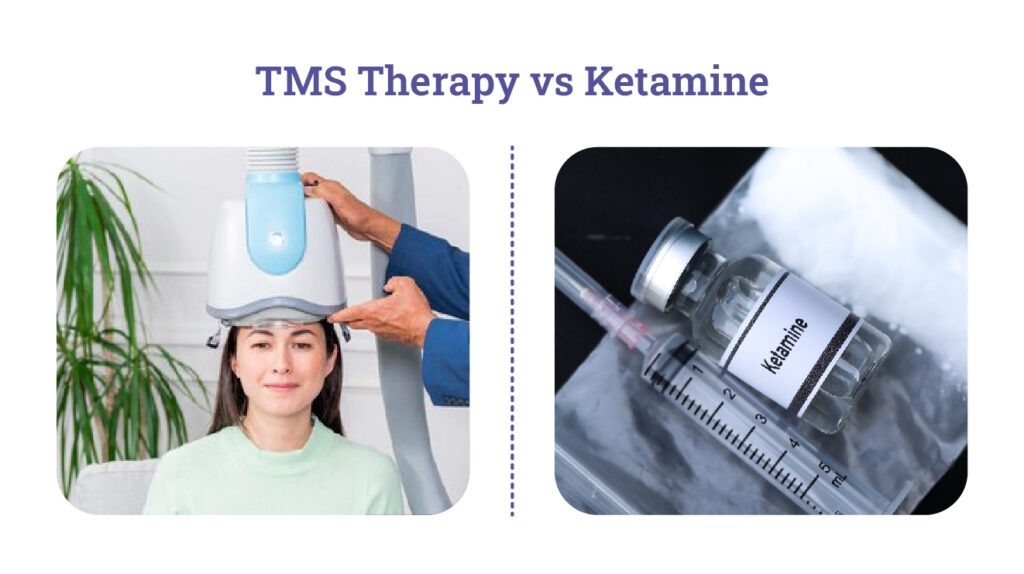Address
440 West Street, Suite 318 Fort Lee, NJ 07024
Contact
Hours
Mon - Fri: 9am - 9pm Sat - Sun: Closed

Bipolar disorder is a complex mental health condition marked by extreme mood shifts ranging from manic highs to depressive lows. Manic episodes may involve heightened energy, impulsivity, and risky behavior, while depressive episodes often bring deep sadness, hopelessness, and fatigue. These cycles can disrupt relationships, careers, and overall quality of life.
The causes of bipolar disorder are multifactorial, involving genetics, brain chemistry, and environmental triggers. Because of this complexity, treatment requires a personalized approach. For those struggling with severe mood fluctuations, bipolar disorder treatment NJ provides access to innovative therapies, including transcranial magnetic stimulation (TMS) and ketamine, both of which are reshaping how bipolar disorder is managed.
Originally developed as an anesthetic, ketamine has gained recognition for its rapid antidepressant effects, and unlike traditional medications that may take weeks to show results, ketamine can provide symptom relief within hours. This makes it particularly valuable for individuals experiencing treatment-resistant depression or severe bipolar episodes.
Ketamine works by acting on the brain’s glutamate system. It blocks NMDA receptors while increasing glutamate release, which enhances neuroplasticity, the brain’s ability to form new connections. Additionally, it boosts levels of brain-derived neurotrophic factor (BDNF), a protein essential for neuron growth and resilience. These changes help repair disrupted brain pathways, often leading to improved mood, energy, and clarity.
Ketamine therapy offers several advantages for patients living with bipolar disorder:
Rapid relief of depressive symptoms
Patients often feel improvements within hours to days.
Reduction in suicidal thoughts
Clinical studies have shown that ketamine can significantly decrease suicidal ideation.
Mood stabilization support
While not a cure, ketamine can complement other therapies to help manage mood swings.
Hope for treatment-resistant cases
For those unresponsive to standard medications, ketamine provides a new path forward.
However, ketamine is not without limitations. Its effects may be temporary, requiring repeat infusions, and it should always be administered in a controlled medical setting to ensure safety.

TMS therapy and ketamine both provide relief for bipolar disorder but work in very different ways.
TMS therapy uses magnetic pulses to stimulate areas of the brain linked to mood regulation. Over multiple sessions, it helps rebalance brain activity, leading to long-term improvements in emotional stability.
Ketamine therapy acts more quickly, often within hours, by reshaping neurotransmitter activity. It is particularly effective for acute depressive episodes or when immediate relief is needed.
For some patients, combining both treatments may deliver the best results: ketamine for short-term relief and TMS for long-term stability. If you’ve been searching for a trusted provider, exploring options for TMS near me ensures you find accessible, high-quality care.
Ketamine therapy is generally safe under medical supervision. Common side effects include nausea, dizziness, mild dissociation, or drowsiness, most of which resolve within hours. Patients with a history of substance abuse should be carefully evaluated, as ketamine does carry a small risk of dependency.
Preparation is also key: maintaining hydration, eating a balanced diet, and fostering a calm mindset before treatment can maximize its effectiveness.
Emerging research suggests that pairing TMS therapy with ketamine can provide powerful results. Ketamine offers rapid symptom relief, while TMS helps maintain mood stability over time. Together, they represent a comprehensive strategy for individuals with severe or treatment-resistant bipolar disorder.
For patients in New Jersey, innovative programs combining both therapies are becoming more widely available. Clinics offering ketamine NJ treatments are increasingly integrating them with TMS to improve outcomes and expand treatment options.

As research continues, ketamine and TMS are shaping the future of psychiatric care. No longer limited to medication and psychotherapy alone, patients with bipolar disorder now have access to therapies that are both fast-acting and long-lasting. These breakthroughs provide not only relief from symptoms but also hope for a more stable, fulfilling life.
Living with bipolar disorder is challenging, but advances in modern psychiatry are making recovery more attainable than ever. Both ketamine and TMS therapy offer new ways to reduce symptoms, stabilize mood, and restore balance. Whether you choose one or a combination of both, working with a trusted provider is the key to achieving lasting progress.
As part of a comprehensive mental health evaluation, tools like the autism quotient test can also provide valuable insights especially for individuals with overlapping symptoms or neurodiverse traits that may influence treatment outcomes.
If you are ready to explore these innovative treatments, reach out to HWS Center today. With expertise in both ketamine and TMS therapies, our specialists deliver personalized care that empowers patients to take control of their mental health journey.
Schedule a consultation! Provide your contact information below and we’ll get back to you as soon as we can.
When administered in a clinical setting, ketamine is considered safe for individuals with bipolar disorder. Side effects such as dizziness or mild dissociation are usually temporary. Patients should undergo a thorough evaluation with their provider to ensure the treatment is appropriate for their unique condition. In New Jersey, clinics specializing in ketamine NJ treatments follow strict safety protocols, further reducing risks and improving treatment outcomes.
Yes. TMS therapy has been shown to improve mood regulation in individuals with bipolar depression by stimulating underactive brain regions. It is a non-invasive and well-tolerated therapy that can be especially effective for those who have not responded to medication. Many patients notice gradual improvements over several weeks of consistent sessions, making it a strong option for long-term stability.
There have been rare reports of ketamine triggering manic symptoms. This is why careful screening and ongoing monitoring are essential when using ketamine for bipolar disorder. Working with experienced providers significantly reduces the risk of ketamine-induced mania. Clinics offering bipolar disorder treatment NJ typically use tailored dosing strategies to ensure patients achieve relief without worsening manic phases.
The effects of ketamine vary, with some patients experiencing relief for days or weeks after a single infusion. Maintenance sessions are often recommended to prolong results, especially for those with chronic bipolar depression. A structured treatment plan designed by ketamine NJ providers can help patients extend these benefits and avoid relapse of symptoms.
The choice depends on your specific symptoms and treatment goals. Ketamine provides rapid relief during depressive episodes, while TMS offers long-term mood stabilization. Many patients benefit from integrating both therapies under professional guidance. Exploring combined treatment options at a local TMS near me clinic can give patients the flexibility to balance fast results with lasting improvements.
Access to both therapies has expanded significantly in recent years, with more clinics offering specialized care for bipolar disorder. Patients searching for ketamine NJ or TMS near me can often find providers within their region, making these treatments more convenient and widely available. This improved accessibility ensures more people can benefit from advanced, non-invasive options.
Yes. Combining TMS and ketamine is becoming an increasingly popular approach for individuals with severe or treatment-resistant bipolar disorder. Ketamine helps provide rapid symptom relief, while TMS delivers long-term mood stabilization. When administered together under professional supervision, the therapies can complement each other, offering both immediate and sustained benefits.
Look for licensed therapists, psychiatrists, or a mental health treatment center specializing in personalized treatment plans for major depressive disorder and other mental health conditions.
440 West Street, Suite 318 Fort Lee, NJ 07024
Mon - Fri: 9am - 9pm Sat - Sun: Closed
HWS Center © 2025 | All rights reserved | For Ketamine Treatment NJ | Created by Invisio Solutions Ltd
We use cookies to improve your experience on our site. By using our site, you consent to cookies.
Manage your cookie preferences below:
Essential cookies enable basic functions and are necessary for the proper function of the website.
Google reCAPTCHA helps protect websites from spam and abuse by verifying user interactions through challenges.
Google Tag Manager simplifies the management of marketing tags on your website without code changes.
You can find more information in our Cookie Policy and Privacy Policy.